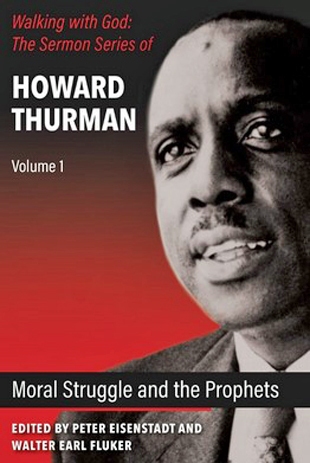Howard Thurman (1899 - 1981) is one of the classic Christian and interfaith teachers of the twentieth century. You can read more about him in our Remembering Spiritual Masters Project.
The co-editor of this volume, Walter Earl Fluker, is senior editor of The Papers of Howard Washington Thurman and a professor emeritus at Boston University, where those papers are held. Co-editor Peter Eisenstadt is author of a new acclaimed biography, Against the Hounds of Hell: A Life of Howard Thurman, recently reviewed here.
After growing up in the Jim Crow-era American South and graduating from Morehouse College and Rochester Theological Seminary, Howard Thurman lived an eventful life for a pastor and professor, surrounded by the century’s most influential religious and cultural leaders and Black activists. In the mid-‘30s he traveled to India and met with Mahatma Gandhi. In the ‘40s he was dean of Rankin Chapel at Howard University, at the center of African American intellectual life. In the ‘50s, he was dean of Marsh Chapel at Boston University and mentored Martin Luther King, Jr. and Rabbi Zalman Schachter-Shalomi, among others.
For a half-century he was also an ordained Baptist pastor with a broad take on contemporary affairs and a deep appreciation of people of all faiths. He pastored churches, taught at various colleges and universities, and was a poet and philosopher. He preached many sermons, some of which are gathered into this book. “By the early 1930s Howard Thurman was one of the most prominent young ministers in America, much sought after to speak before both white and black audiences.”
Part one focuses on the moral struggles of life, exemplified in figures from biblical history such as Jesus and the Apostle Paul, recent historical figures such as Albert Schweitzer (see the excerpt accompanying this review), and certain authors of classic works of literature, such as Herman Melville and Moby-Dick and Goethe and Faust. Part two collects eight messages on the prophets of the Hebrew Bible, or Old Testament, as it is sometimes called.
The central theme that runs through all of this is the moral struggle we face living our lives and the importance always of courage and truth. Thurman says that every human act is consequential and that God is intimately interested in the course of human events. He also says, “No situation is ever completely without hope as far as the divine option is concerned. God is never without a redemptive alternative.”
Most of the texts are transcribed from audiotapes, so do not be surprised if the reading is not as smooth as one usually finds in books.
Most importantly, as the editors explain and the messages demonstrate, “Thurman believed that the transformative power that is discovered in one’s inner life must of necessity be worked out in the political and social dimensions” of one’s life in the world.
